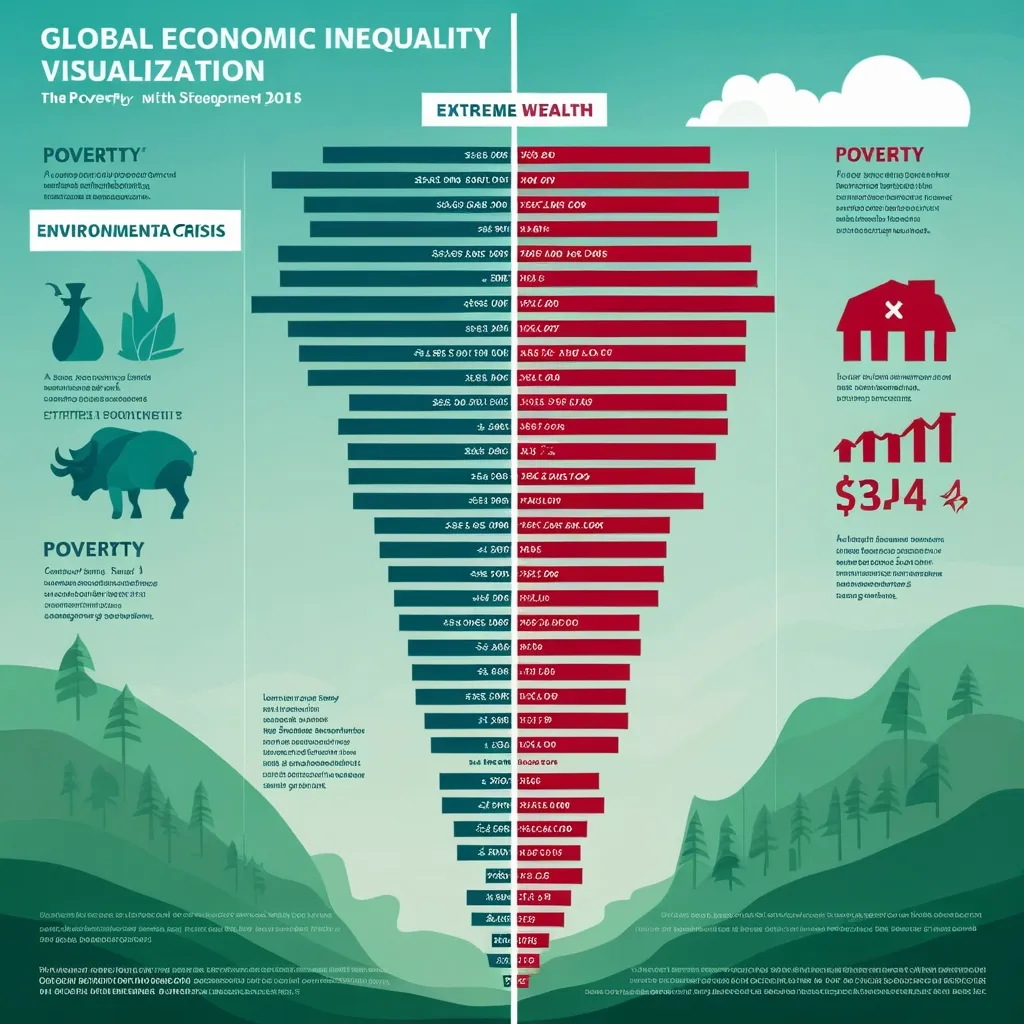The Invisible Hand’s Shadow: How Ultra-Wealth Shapes Global Crises
We’ve all heard about the “invisible hand” of the free market, right? It’s this idea that when everyone acts in their own self-interest, it somehow magically benefits society as a whole. Sounds pretty neat in theory. But let’s face it, the reality we’re living in today is a far cry from that rosy picture.
Think about it. We’re in a world where the richest guys are getting richer by the minute, while the rest of us are struggling to keep up with rising costs and climate disasters. It’s like watching a game of Monopoly where a few players start with all the hotels and everyone else is just trying not to go bankrupt on their next turn.
Let’s break it down a bit. Since 2020, the five richest dudes on the planet have more than doubled their already massive fortunes. We’re talking about them raking in $14 million every single hour. That’s more money than most of us will see in a lifetime, and they’re making it while we’re all asleep!
Meanwhile, billions of people are out here wondering how they’re going to pay their next bill or put food on the table. The cost of living is through the roof, the planet’s heating up faster than a microwave burrito, and we’re still dealing with the aftermath of a global pandemic. It’s like we’re all living in different worlds, isn’t it?
Now, you might be thinking, “Well, that’s just how capitalism works, right?” But here’s the kicker - this isn’t just some random quirk of the system. It’s starting to look a lot like the ultra-wealthy are actually engineering these crises to their advantage.
Take corporations, for example. These giant companies, often run by billionaires, have their fingers in every pie. They’re not just selling us stuff; they’re shaping entire markets, influencing government policies, and even deciding how much carbon gets pumped into the air. And guess what? A lot of them are blocking efforts to switch to clean energy because it might hurt their bottom line. Talk about putting profits over people!
It’s like they’re playing a giant game of Monopoly, but instead of little plastic houses, they’re dealing with real lives and the future of our planet. And just like in Monopoly, once a few players start dominating, it gets harder and harder for anyone else to catch up.
This concentration of wealth isn’t just about a few people having nice yachts and fancy cars. It’s about power. When you’ve got that much money, you can pretty much control everything - wages, prices, even access to medicines. It’s like they’ve got their hands on all the important levers of society, and they’re pulling them in ways that benefit them, not us.
And it’s not just happening in one country. This is a global issue. Rich nations are still exploiting poorer ones, keeping them trapped in a cycle of debt and poverty. It’s like a modern form of colonialism, where instead of sending in armies, they’re using financial instruments and unfair trade deals to keep other countries under their thumb.
So, what can we do about it? Well, one big step would be to fix our tax system. Right now, the ultra-wealthy are getting away with paying peanuts compared to what they could contribute. Did you know that only 4 cents out of every dollar of tax revenue comes from wealth taxes? And many billionaires live in places where they don’t even have to pay inheritance tax. It’s like they’ve found all the cheat codes for the game of life.
Imagine if we implemented a tax of up to 5% on multi-millionaires and billionaires. That could raise enough money to lift billions of people out of poverty and even end world hunger. It’s not about punishing success; it’s about creating a fairer system where everyone gets a real shot at a decent life.
But here’s the thing - this isn’t just about individual greed. It’s a systemic problem. Our economic system is set up in a way that allows the richest 1% to grab nearly two-thirds of all new wealth, while the bottom 90% are left fighting over crumbs. This isn’t an accident; it’s the result of policies and structures that have been put in place over time.
We’re at a crossroads now. If things keep going the way they are, we might see the world’s first trillionaire pretty soon. Meanwhile, at the current rate, it would take 230 years to end poverty. That’s not just unfair; it’s downright ridiculous.
So, what’s the solution? Well, it’s not going to be easy, but we need to fundamentally change how our economies work. We need governments to step up and rein in corporate power, break up monopolies, and implement fairer tax systems. We need to explore ideas like employee ownership and more democratic corporate structures.
Imagine if 10% of every business in the U.S. were employee-owned. That could double the wealth of the bottom 50% of the population and significantly increase the median wealth of Black households. It’s not just about making things fairer; it’s about creating a system that works for everyone, not just a select few.
The invisible hand that Adam Smith talked about was supposed to guide markets towards what’s best for society. But right now, it feels more like that hand is giving most of us the middle finger while handing bags of cash to billionaires.
We need to reclaim the idea of an economy that works for all of us. That means recognizing the flaws in our current system and being brave enough to make big changes. It’s not going to be easy, and you can bet those with all the power and money won’t give it up without a fight.
But here’s the thing - we can’t afford not to make these changes. The future of our world, quite literally, depends on it. We’re talking about the air we breathe, the water we drink, the food we eat, and the kind of world we leave for our kids and grandkids.
So, the next time someone tells you about the magic of the free market and the invisible hand, remember this: that hand isn’t invisible anymore. We can see it pretty clearly, and it’s time we all worked together to make sure it’s working for all of us, not just a lucky few.
It’s time to rewrite the rules of the game. We need an economy that values people over profits, that prioritizes the health of our planet over the wealth of a few individuals. We need a system where success is measured not just by how much money you make, but by how much you contribute to the well-being of society as a whole.
This isn’t about tearing everything down. It’s about building something better. It’s about creating an economy that’s fair, sustainable, and gives everyone a real shot at a good life. It’s about recognizing that we’re all in this together, and that when we lift up the most vulnerable among us, we all benefit.
So, what can we do? We can start by educating ourselves and others about these issues. We can support politicians and policies that prioritize economic fairness and environmental sustainability. We can make conscious choices about where we spend our money, supporting businesses that treat their workers well and care about their impact on the planet.
And most importantly, we can refuse to accept the status quo. We can demand better from our leaders, our corporations, and ourselves. We can remember that the economy isn’t some force of nature that we have to accept as is - it’s a human creation, and we have the power to change it.
The invisible hand doesn’t have to be a fist. With effort, awareness, and collective action, we can turn it into an open palm, ready to lift us all up together. It won’t be easy, and it won’t happen overnight. But it’s a fight worth having, because the alternative - a world of ever-increasing inequality and environmental destruction - is simply not sustainable.
So, let’s roll up our sleeves and get to work. The future is ours to shape, and it’s time we took back control from those who would engineer crises for their own benefit. Together, we can create an economy that truly works for everyone, not just the ultra-wealthy few. It’s time to make the invisible hand visible again, and to ensure it’s working for all of us, not against us.






